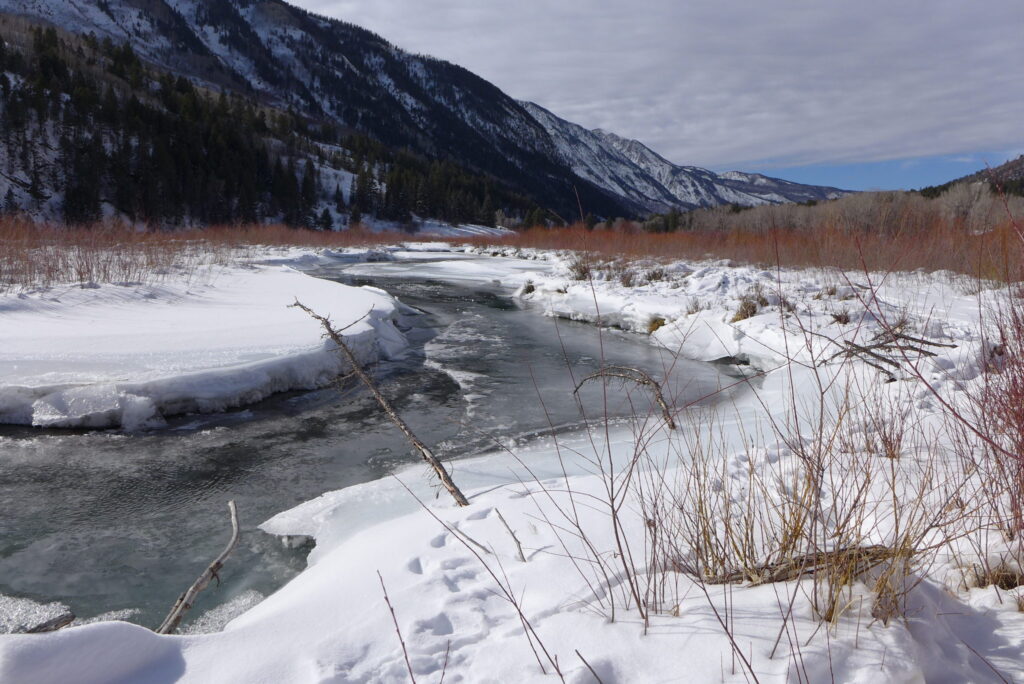
MARBLE — The U.S. Army Corps of Engineers has denied local groups’ request for a public hearing in the case of a marble quarry that violated the Clean Water Act.
In a Dec. 28 letter to Pitkin County and others, Benjamin Wilson, project manager for the Army Corps’ Colorado West Section, said the agency does not intend to conduct a hearing or public meeting.
“We do not believe there would be a valid interest served or that we would receive any substantial new information we would not otherwise obtain through the public notice comment and review process we are currently engaged in,” the letter reads.
In separate comments submitted to the Army Corps, Pitkin and Gunnison counties, the Crystal River Caucus, the Roaring Fork Conservancy and the Crystal Valley Environmental Protection Association (CVEPA) had asked for monitoring, restoration, mitigation and a chance for the public to weigh in about the situation at the Pride of America Mine, which sits above the town of Marble.
“We are definitely not going to accept this,” said John Armstrong, director of CVEPA. “To not even offer to hear what the public has to say in a public hearing is kind of shocking to me.”
In the fall of 2018, mine operator Colorado Stone Quarries (CSQ) diverted a roughly 1,500-foot section of Yule Creek from its natural channel on the west side of Franklin Ridge, a rock outcropping, to the east side of the ridge so that it could build a road. Operators piled the streambed with 97,000 cubic yards of fill material, including marble blocks.
In March, the Army Corps determined that these actions, which were done without the proper permit, violated the Clean Water Act. CSQ is now retroactively applying for that permit, known as a 404 individual permit. Under Section 404 of the Clean Water Act, a project requires a permit from the Army Corps if it includes the discharge of dredged or fill materials into waters such as rivers, streams and wetlands.
In its permit application, CSQ proposed making the creek relocation permanent by leaving it where it is on the east side of the ridge. The company says this is the most efficient and environmentally sound option, and it results in the closest return to pre-diversion stream conditions.
Wilson said the Army Corps received more than a dozen comments, which have been forwarded to the mining company, along with additional questions from the Army Corps. Wilson said mining company officials must address these comments and propose a plan to mitigate the damage caused by the creek relocation. The deadline for the quarry to respond is Jan. 23, but Wilson said it will probably take the company longer than that to come up with a mitigation plan.

Pitkin County wants the mining company to restore the riparian habitat, conduct water-quality monitoring at multiple sites in the basin and compensate for any damage by doing restoration projects in other areas. County representatives identified eight projects that could provide compensatory mitigation in the Crystal River basin, including restoration of Filoha Meadows streambanks, Thompson Creek riparian restoration and Crystal River streambank stabilization.
Carbondale-based Wilderness Workshop agrees. The conservation organization is also getting involved in the issue, signing on to the comments provided by CVEPA.
“It is a shocking issue,” said Peter Hart, conservation analyst and staff attorney for Wilderness Workshop. “Obviously, the damage is done, but I think that we’d like to see fines for violations imposed and see those funds actually utilized for restoration projects in the Crystal River valley.”
CSQ senior consultant Katie Todt, who is with Lewicki & Associates, said the company is evaluating potential mitigation options, including improvements to the current stream channel within the quarry’s permit area, which should stabilize the creek bank and promote vegetation growth. The company will more fully set out mitigation options in its expected Jan. 22 response to the Army Corps.
Wilson said that even though there won’t be another opportunity for the public to formally provide comments, the Army Corps is still obligated to consider any new information that comes to light.
Assistant Pitkin County Attorney Laura Makar said it was disappointing that the Army Corps decided not to hold a public hearing, especially since this is an atypical, retroactive permit application, submitted after the work needing a permit was already complete. There was significant information that could have been shared in a public hearing, she said.
“It would have been a good opportunity to ensure the record was complete,” Makar said.
This story is by Aspen Journalism and ran in the Jan. 8 edition of The Aspen Times.
The Water Desk’s mission is to increase the volume, depth and power of journalism connected to Western water issues. We’re an initiative of the Center for Environmental Journalism at the University of Colorado Boulder. The Water Desk launched in April 2019 with support from the Walton Family Foundation. We maintain a strict editorial firewall between our funders and our journalism.





